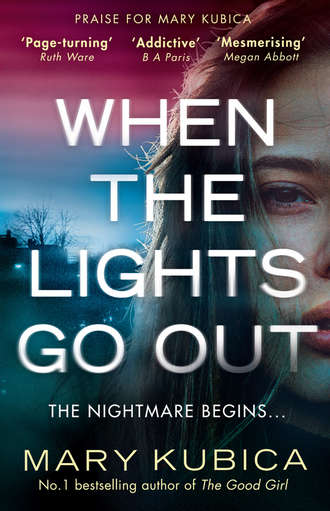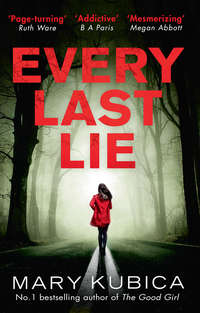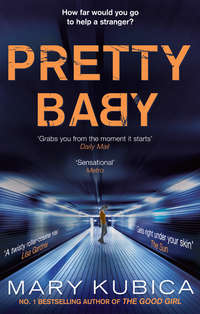
Полная версия
When The Lights Go Out: The addictive new thriller from the bestselling author of The Good Girl
Mom is dead.
I wonder if it hurts when you die. If it hurt when Mom died. And I think, in frightening detail, what it feels like when you can’t breathe. I find myself holding my breath until my lungs begin to hurt, to burn. It’s a prickling pain that stretches from my throat to my torso. It’s reflexive, automatic when my mouth gapes open, and I suck in all the oxygen I can to soothe the burn.
It hurts, I decide. It hurts to die.
There’s a clock on the wall, one that came with the house. Tick, tock, tick, tock, it goes all night long, keeping track of the minutes I don’t sleep. Keeping count for me. It’s loud, a conga drum pounding in my ear, and though I try and remove the batteries, the tick, tock doesn’t go away. It stays.
I feel out of place in this strange place. The house smells different than what I’m used to, an earthy smell like pine. It’s older than Mom’s and my old home, where I lived my entire life. One of the windows doesn’t close tight so that when the wind whips its way around the house as it does tonight, air sneaks in. I can’t feel it but I hear it, the hiss of the wind forcing its way in through a gap.
I lie there in bed, trying hard to catch my breath, to not think about dying, to will myself to do the impossible and sleep. Beside me, on the floor, are four boxes, the only ones I brought from the old home. Some clothes, a few picture frames, and a box of random paperwork Mom kept, just an old white bankers box, kept closed with a string and button. It seemed important enough for Mom to keep, and so I kept it. A thought comes to me now: Could my social security card be in that box, tucked away with Mom’s financial paperwork?
I climb out of bed and turn on a light, dropping to the floor beside the box. I loosen the string and lift the lid, meeting reams of paper head-on. If there’s any sort of method to the madness, I don’t see it.
I search through the paperwork for my social security card, to be sure the numbers I dashed off on the FAFSA form weren’t incorrect. That I didn’t write the wrong ones down by mistake. Because never in my life have I been asked to give my social security number, and so it’s conceivable, I think, that I have the numbers mixed-up. I look for the card itself, grabbing stacks of paper by the handful and flipping through them one sheet at a time, hoping the card falls out. But instead I find the deed to our home, an old checkbook ledger. Gas and electric bills. Years’ worth of tax returns that gives me pause, because if I know one thing, it’s that Uncle Sam isn’t about to pay out tax refunds without a social security number.
I set everything else aside except for the tax returns. My eyes go straight to the exemptions, the spot where someone would list their dependents and their dependents’ social security numbers, meaning me and my social security number. Except that when I come to it, I find the line blank. Mom didn’t list me as a dependent and, though I double-check the year of the form to be sure I was alive at the time, I see that I was. That I was eleven years old at the time the form was completed.
And though I don’t know much about income taxes, I do know it would have saved Mom a buck or two if she had thought to use me as a tax deduction. A baby gift from Uncle Sam.
I wonder why Mom, who was frugal to a fault, didn’t claim me as a dependent that year.
It was a mistake, I think. An oversight only. I dig through to find another 1040 in the tower of paperwork—this one older, when I was four years old—and search there for my name and social security number, finding it nowhere. Another year that Mom didn’t claim me.
I sift through them all, six tax return forms that I can find—my movements becoming faster, more frantic as I dig—and discover that never once did Mom claim me as a dependent. Not one single time.
I turn off the light and get back into bed. I lie there, wondering why Mom didn’t claim me as a dependent. What did she know about the IRS that I don’t know? Probably a lot, I reason. I don’t pay taxes. I’ve never once been sent a check from them. My only knowledge comes from hearsay, from eavesdropping on clients like Mr. and Mrs. Ricci, discussing whether they could claim Mrs. Ricci’s shopping binges as exemptions, all those fancy clothes she toted home in the trunks of cabs.
Mom must’ve had a good reason for what she did.
I listen to the clock, tick, tock. I don’t bother closing my eyes except to blink, because I know that I won’t sleep. I pull the blanket up clear to my neck because it’s cold in the room. Though the thermostat downstairs is set to sixty-eight degrees, I have yet to hear the heat kick on.
Fall is here and winter is coming soon.
I’m rubbing my hands together for friction, to try and create heat. To make myself warm. I rub them together and then press them to my cheeks. Rub and then press, rub and then press. And that’s when I hear a noise.
It’s sudden, the kind of noise that makes me sit up straighter in bed, that makes me hold my breath to listen.
The only way to describe it is a ping. A ping, and then nothing. Ping, and then nothing. It’s a piercing noise when it comes, like some sort of mechanical bleep or chime, the second or two between each ping a welcome reprieve. I rub at my ears, certain at first that the noise originates there, in my own eardrums. That it’s merely tinnitus, a ringing in the ears, something only I can hear.
But then I realize it’s not coming from my ears.
It’s coming from somewhere on the other side of the room.
I stare though the blackness but see nothing. It’s too dark to see much of anything, aside from my own hand when it’s pressed all the way up to my face. And so I push the blanket from me and rise, following the noise. I move blindly, feet guiding me, my steps small because I don’t know what’s in front of me. Where the bedroom ends and the stairs begin. I have to be careful so that I don’t fall.
I skirt around the edge of the bed, where I find myself on the other side of the room, hunched at the shoulders because the squat ceiling doesn’t allow me to stand upright. From there, the noise rises up from the floor to greet me.
I drop to my knees, running my hands over a metal grate by accident. There I discover a floor register, one of those metal contraptions that attaches to the end of an air duct and leads somewhere under the floor, to some other room in the home. That’s where the ping is coming from, from some other room in the home. In my imagination, I see a mallet being tapped against the slats of another register in another room, because that’s what it sounds like to me. Like metal on metal, rhythmic and fixed.
I lie on the floor, pressing an ear to the grate so I can hear it more clearly. The ping. Which makes me think only of sonar emitting pulses underwater and then waiting for them to return, to see if there’s anything out there, anything like whales or submarines. Except the only thing here is me.
I’m overcome with the strangest thought then. An irrational thought but one that somehow makes sense.
Someone is trying to speak to me. To communicate with me.
I press my lips again to the cold metal grate and call out, “Hello?”
At first there’s no reply. The ping disappears, and as I sit there, waiting foolishly for someone to respond to me through the floor register, I realize this is ridiculous. Of course there’s no one at the other end of the floor register speaking to me.
Because if there was, that would mean they’re in the carriage home with me.
A chill rises up my spine, one vertebra at a time.
Is there someone in the carriage home with me?
I rise to my feet and scurry across the room—quicker this time, forgetting altogether about falling down stairs. I reach out to flip on the bedroom light. A yellow glare spreads over the room, obliterating the darkness. I stand at the top of the steps, staring down over the rest of the carriage home, listening for sounds, watching for movement. But there are none.
“Is anyone there?” I call over the stairwell, my voice timid and afraid. My heart beats hard; my hands begin to sweat. For three or four minutes, no one appears and in time, logic begins to watch over me. I shake my head, feeling stupid.
Of course no one is here.
It’s the newness of the home that’s to blame. That’s what has me on edge. Because for the first time in my entire life, I’m alone and somewhere new. I feel lost without Mom, not knowing who I am or where I belong. If I belong anywhere.
I turn off the bedroom light, and the room is once again plunged into darkness. It’s darker now than it was before because my eyes have adjusted to the light. I creep across the room and back toward the bed, reminding myself that this house is old. Old homes come with all sorts of strange but innocuous noises. Rats living in the insulation, the settling of the home, water moving through the pipes. That’s all that it is.
As I reach for the bed, I almost have myself convinced.
Until seconds later when the voices come. Female voices by the pitch of it, higher than that of a man. I suck in a gulp of air and hold it in, not believing my own ears.
Someone is there.
The voices are hard to hear, as if they’re a million miles away, the sound dampened by distance and the network of aluminum tubes that make up the ductwork. At first it’s only sounds, the cadence of women speaking, but no words that I can make out.
Until I do.
“It won’t be long now,” I hear, and at first I’m scared. My knees buckle. My throat constricts. My hands go to my throat without meaning to, pressing hard against my vocal cords. My tongue turns to sandpaper and though I’m cold, sweat breeds on my skin.
I see women in some sort of insulated room, by the sound of it. Patients in a psych ward, the walls covered with plastic and foam; a door, padded on the inside, but reinforced with steel. No knob on the door. No way to leave. That’s where I imagine the women are.
I stagger back to the floor register, setting myself down over it. I press my ear to the grate, willing the voices to return again, but at the same time hoping they won’t. Because I pray that no one is here.
I call into the floor register, my voice mousy at first, scared, “What? What won’t be long now?” Though my words are a whisper only, and if they were standing in the very same room as me, two feet away, they wouldn’t hear.
I cup my hands around my lips, pressing them flush to the floor register this time, so close I taste the bitter metal in my mouth. I call out, voice louder and more emphatic than it was before, “Can you hear me? Is anyone there?”
The only words I hear are low and plaintive. “She’s dead to the world.” But to my question there is no reply. Whoever is there can’t hear me.
The voices are hollow at first before they go silent. They disappear completely as I sit there, pressing my ear to the floor register in vain. But the only sound that I hear now is the tick, tock of the wall clock.
My pulse is going at a breakneck speed. It pounds hard through my temple, my wrist. Wind rattles the carriage home, hissing its way in through the window’s gap.
A noise returns from the floor just then and I think that they are back. The women, the voices. The ping. I press my ear to the metal grate and listen.
But this time the only thing that comes is a rush of lukewarm air blasting into me.
The heat. The heat has finally kicked on.
I think of the maze of tubes that work their way through the home and into this room from the furnace. The pipes and fittings and ducts. The ductwork, which, for a home this old, whimpers at every bend like the high pitch of female voices speaking, a whimper that my tired mind only doctored into words. There were never any women there.
It was the furnace’s burners igniting, starting to produce heat. The furnace spurting air into the home. It comes out with a whine this time, and I press my hands to the grate to thaw them out.
I’m aware suddenly of just how much my entire body aches.
The insomnia has taken my sleep from me, and now it’s taking my mind. Turning the gray matter to sludge. How long can I go on, I wonder, without sleep?
I return to bed and lie down on the mattress, staring out the open window at the sky. It’s turned black now, though before I can sleep, dawn will be here. Not in the blink of an eye because that’s not the way it is with insomnia.
Time is as slow as the three-toed sloth when you can’t sleep.
eden
August 2, 1996 Egg Harbor
The days have grown longer now that the task of getting settled into the cottage is through. The walls are painted; the unpacking is done. The garden has become a waiting game, staring at the soil, waiting for something to appear. Always waiting.
Every day, once Aaron has gone off to work, the next ten hours last a lifetime to me. Ten hours with nothing to do but wait until Aaron comes home to keep me company. Afternoons alone are lonely; dinners alone are lonely. I can’t fall asleep until Aaron, completely tuckered out from another work shift, drops into bed beside me, nor can I bring myself to admit to him that I am lonely and bored.
Before leaving Green Bay I worked reception for a local pediatrician. It wasn’t anything glamorous or ambitious, answering phones, greeting customers, coding medical records, tallying up bills, but it was something. But now Aaron has suggested that I not work, that I stay home, that soon enough we’ll have a baby to raise and then I’ll have something to do.
On occasion Miranda and her boys stop by for a visit, their afternoons long and lonely as well. We sit in the backyard, watching Jack and Paul wreak havoc on the tree swing, and as we do, I listen to Miranda depreciate parenthood, complain about her husband and her kids, knock the tedium of her everyday routine: the frozen waffles, the syrup in the hair, the messy bath times and all the books that she and her children are meant to read but never do because it’s far too easy to just let them watch TV. Her husband—Joe—wants her to limit TV time to an hour a day, and Miranda laughed at this, saying Joe didn’t have the first clue what it was like to be pregnant, what it was like to raise rough-and-tumble boys like Jack and Paul. She’d take any quiet time she could get, even if it meant they sat perched in front of the TV for five hours at a time, so close they were liable to go deaf and blind. She didn’t care. Anything so long as they were quiet.
These were the words Miranda used and I stared at her openmouthed; I could hardly believe my ears. I agreed with Joe, treading carefully, delicately, saying how I’d read that too much TV can lead to obesity in children, to aggressiveness among other things, and she made light of this, saying I didn’t know the first thing about being a mother.
“Just wait until you’re a mother,” she said. “Then you’ll see,” while hoisting her bare feet onto my patio chair and drinking her lemonade.
And then when adorable little Paul ran over and made every attempt to scamper onto her lap, hot and sweating, Miranda shirked away, saying, “Come on, buddy, it’s too hot for laps today,” while pushing him off as if he was some sort of bug who’d landed on her legs.
In that moment, what I wanted to do—what I ought to have done—was pull him up onto my own lap. Let him rest his tiny head on my shoulder for a while. He was tired too, in addition to hot and sweating, his eyes begging for a cool bath and his afternoon nap, though Miranda was too busy whining about the drudgery of motherhood and wasn’t yet ready to leave.
Suddenly I wanted to feel the weight of him on my own two legs; I craved the heat of his skin on mine. I wanted to press those blond curls away from his eyes.
I’ve started noticing kids with more frequency lately. Little kids, big kids. Babies. Kids at the park. Kids at the market. Kids walking down the streets of town, holding hands with their fathers and mothers. It seems everyone in the world suddenly had kids, everyone but Aaron and me.
Had they been there all along and I failed to notice?
Or did they arrive just then and there the moment Aaron and I decided to conceive?
I didn’t welcome Paul onto my lap as I wanted to do, but watched instead as he pouted and walked away, forced off Miranda’s lap with her own two hands. His eyes were downcast, his bottom lip thrust out. He cried, not big crocodile tears but rather quiet and ashamed tears, the tears of someone who’d been told one too many times not to cry.
And, as he disappeared to a corner of the yard to be sad, Miranda released a massive sigh of relief, grateful Paul was gone and she could once again breathe.
August 14, 1996 Egg Harbor
It’s starting to become apparent that sex alone doesn’t lead to a baby.
When I woke this morning with blood dotting the inside of my underwear, my belly seized by a cramp, I knew another month had come and gone without a child. After the second month of trying, that blood in my underwear came as a startling blow, and there in the bathroom, hunched over the toilet seat, staring at the candy-apple red flecks on the lining of my favorite lace underwear, I began to sob. I kept it quiet and stifled, so that Aaron, in the kitchen brewing our morning coffee, couldn’t hear. I didn’t want him to know that I was upset. For whatever reason, I’d convinced myself over the last few days that every single twitch and prick I felt were the earliest signs of pregnancy. The tenderness in my chest, the desire to lay waste to almost everything I could find in the pantry, especially that which was high calorie, high fat.
These weren’t signs of pregnancy after all, but rather signs of my period. The same ones I’d felt every single month for the last fifteen years of my life, since the middle of seventh grade when I started my period in science class, red blood seeping through a pair of white jean shorts. And now my biological clock had only convinced me I was pregnant. I’d been sure I was nauseated, morning sickness already, when what it was was a change in hormones, my uterus clearing the decks, paving the way, getting ready to welcome a life that wouldn’t be.
I feel empty now, robbed of something that was mine, but why?
How can I grieve for something I never had?
After Aaron left for work, I scrubbed my underwear clean with detergent and bleach and headed into town. I couldn’t bring myself to tell him about the blood. Of course we don’t much talk about babies and pregnancy or use words like ovulation or conceive. Ostensibly, we just have sex, though inwardly what I’m thinking about, what we’re both thinking about, as we lie together in the moments afterward, my head draped across his chest, his warm hands massaging me, moving yo-yo-like up and down my back, is the end product, our handiwork, our creation, Aaron and me coming together, the best of him and the best of me fusing to create a baby.
I know he wants this as much as I do.
Only one time did Aaron whisper to me as we lay there in the darkness of the bedroom, still trying hard to catch our breaths after we were through, that he wondered what she would look like and when I asked, “Who?” he said, “Our baby girl. Our baby girl.” I beamed there from ear to ear and when I told him I didn’t know, he said, “I bet she’ll look like you.”
And then he kissed me slowly and deeply, the kind of kiss I felt all the way to my every extremity, and though he didn’t say it, I knew that in Aaron’s eyes if our baby girl looked like me, that she’d be the most beautiful girl in the world.
In all my life no one has ever made me feel as special as Aaron makes me feel.
I’ve watched him garden, watched the way he carefully carries the peat pots from greenhouse to garden, his every move screaming of paternal instinct; the way he digs the perfect holes, assessing their dimensions twice for accuracy; the way he lays the tiny biodegradable contraptions inside as if setting an infant in a crib, scattering soil over the top as gently as drawing a blanket to a sleeping child’s chin. He waters and watches and waits, and as he does, I watch him, this solid figure who, by his stature alone should be anything but gentle and soft-spoken, and yet he is. He wears his chestnut hair short these days, easier to hide behind the chef’s cap so there can be no false claims of hair in food, at least not from him, his hands and forearms marked with a selection of scratches and burns. For as long as I remember, he’s had them, those scratches and burns: badges of honor, war wounds dating back to his culinary school years.
There are times I find that I can’t take my eyes off those scars.
Each time he steps carefully through the garden, tending the seeds, careful not to step on our seedlings, it strikes me what a good father Aaron will one day be, so patient, so protective, so loving, the way he is with me.
And so, to say the words aloud now, to tell him I’ve started my period, would be to confess to Aaron that though we tried again this month, tried to conceive a baby, we failed.
After I wiped my eyes, I joined him on the dock for coffee and together we watched the boats pass by and shortly before two o’clock, as always, he left for work and again I was alone.
jessie
Everything changes with the break of day.
As the sun rises, gliding over the horizon, the world turns bright. The oppressive burden of night disappears. For the first time in eight long hours, I can breathe.
In daylight, I find myself standing above the floor register on the bedroom floor, feet straddling it. I stare down at the black rectangle between my legs. There’s nothing ominous about it; it’s just an ordinary metal grate, cold now, the furnace no longer producing heat. I rub at my arms in an effort to warm them up.
I shower and dress and head out into the day. Outside it’s a cold start, no more than forty degrees that will rise up to sixty-five by midday. The sky is blue for now, though there’s rain in the forecast. The grass is wet with dew. My fingers are cold as I lock the door.
From where I stand, I catch a glimpse of my landlord through the window of her own kitchen. It’s the back of her, just a pouf of hair and the ribs of a blue sweater before they meet with the wooden slats of a chair. It is a distorted image at best, muddled by the reflection of the outside world on glass. She doesn’t see me.
I could knock on the door, make an introduction, but that really isn’t my thing.
I round the side of the carriage home, gathering Old Faithful from the alleyway where I left her, leaned up against the side of the home. Ivy grows up the brick of the garage, the leaves starting to turn red. The alley is abandoned. There is nothing more than garage doors and Dumpsters here. City of Chicago garbage bins. No people. No rats. No feral cats. No signs of life anywhere. I settle Mom and her urn into the basket on back, nothing more than a metal milk crate that I keep secure with bungee cords. We set off down the street.
It’s no secret that Chicago is the alley capital of the country, with over a thousand miles of shadowy backstreets. The kind of darkened corridors where people like to hide their trash and vermin, and nobodies like me.
Morning traffic, as always, is a mess. Millions of people move this way and that like cattle in a cattle drive. My first stop is the same as always: coffee. I take it to go with a sugar twist from the bakery, where the donuts are fresh and the coffee is hot and cheap. I don’t have six bucks a day to spend on coffee, and the owner knows me, sort of. She always says hello and calls me Jenny, and I don’t have the heart to tell her that, after all these years, she’s got it wrong. I set my coffee in the cup holder, pedaling away, making my way toward the Loop. I take my time, moving in wide circles around cars and trucks illegally parked in the bike lines, careful to avoid the city’s sewage grates. I stay away from potholes.






